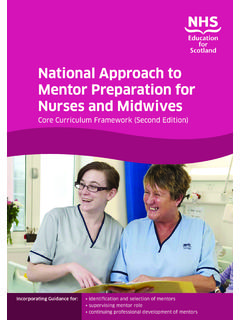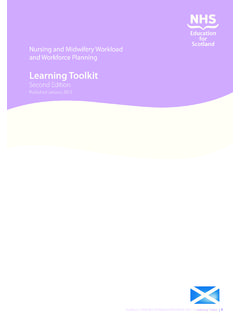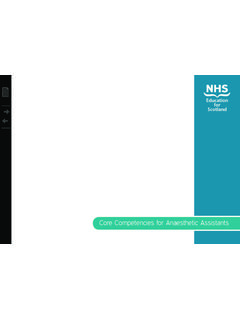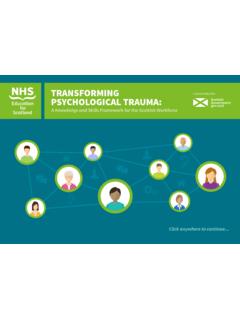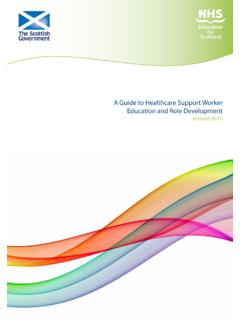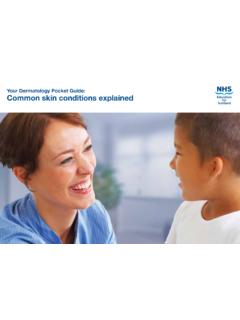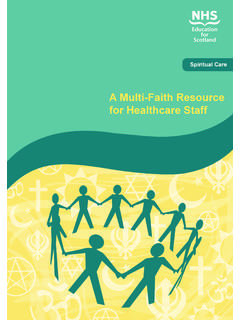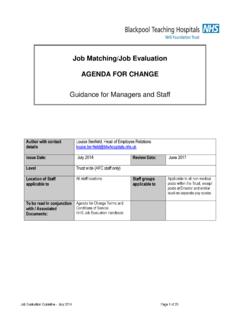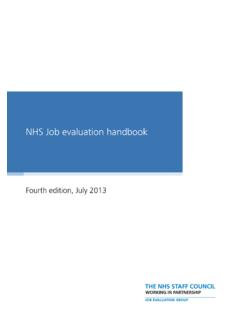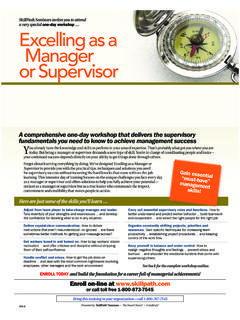Transcription of Paper 2 - nes.scot.nhs.uk
1 Delivering excellence in care to every person, every timeTransforming Nursing, Midwifery and Health Professions (NMaHP) Roles: pushing the boundaries to meet health and social care needs in Scotland2 Paper 2 Advanced nursing practiceIn partnership withDelivering excellence in care to every person, every time BackgroundThe Chief Nursing Officer is committed to maximising the contribution of the nursing, midwifery and health professions (NMaHP) workforce and pushing the traditional boundaries of professional roles. The Transforming Roles programme aims to provide strategic oversight, direction and governance to: develop and transform NMaHP roles to meet the current and future needs of Scotland s health and care system ensure nationally consistent, sustainable and progressive roles, education and career pathways. Phase 1 of Transforming Roles focused on nursing roles. The Transforming Roles Advanced Practice Group was tasked with providing strategic oversight, direction and governance to the development and transformation of advanced nurse practitioner roles.
2 The aims were to: meet the current and future needs of Scotland s health and care system bring together informal nursing role developments emerging from policy or service imperatives to ensure nationally consistent, sustainable and progressive nursing roles and career pathways. This series of brief papers on the Transforming Roles programme aims to update stakeholders on the professions contribution to the wider transformational change agenda in health and social care in Scotland. The second Paper outlines guidance for employers on developing advanced nursing practice in 2 Advanced nursing practiceAdvanced nurse practitioners definitionAdvanced nurse practitioners (ANPs) are experienced and highly educated registered nurses who manage the complete clinical care of their patients, not focusing on any sole condition. ANPs have advanced-level capability across the four pillars of practice: clinical practice facilitation of learning leadership evidence, research and also have additional clinical-practice skills appropriate to their practice represents a level of practice, rather than being related to a specific area of clinical Advanced and specialist practitioners may be functioning at an extremely high level of practice, but with a different clinical preparation and role overviewANPs are educated at Master s level and are competent to work at advanced level as part of multidisciplinary teams across all clinical settings, depending on their area of expertise.
3 1 Advanced practice is not a title recordable by the Nursing and Midwifery Council (NMC), but responsibility for competence remains embedded within the NMC excellence in care to every person, every timeThey are clinical leaders with the freedom and authority to act, and accept responsibility and accountability for those actions. Indeed, advanced practice is characterised by high-level autonomous decision-making, including assessing, diagnosing and treating (including prescribing for) patients with complex multidimensional problems. ANPs have the authority to refer, admit and discharge within defined clinical areas. Annex 1 provides an overview of core ANP competences. Clinical supervisionANPs need effective clinical supervision to develop, maintain and continuously improve their practice. This may be achieved through competence frameworks and locally agreed supervision Framework levelANP posts should be aligned to Level 7 of the Career Framework for Health and reviewed against a minimum of Agenda for Change band 7.
4 It will be appropriate for some posts to be set at a higher band, depending on role and function, and types and levels of for taking advanced nursing practice forward Guidance for NHS boards and employers on taking advanced nursing practice forward is provided in Annex 2. The Transforming Roles Postgraduate Education and Development Group will oversee the development of appropriate pathways leading to advanced practice. These will be supported by flexible and sustainable models of education to ensure consistency and relevance to service needs. Next stepsPhase 2 of this work stream will aim to support employers further by: developing clinical competences in a number of areas of practice creating linked networks to support and develop advanced practice and ANPs supporting, developing and implementing ANP roles in the community nursing team, ensuring succession-planning and implementing career and development pathways in NHS boards considering further how professional accountability infrastructures for ANPs can be embedded across all settings and employers supporting the implementation of phase 1 to ensure all existing and developing ANP roles meet national standards supporting NHS boards/integrated joint boards to work with the Scottish Government to map the current ANP workforce and provide a robust baseline for future workforce planning ensuring the Scottish Government requires all NHS boards to report at least annually the numbers and fields of practice of ANPs.
5 Paper 2 Advanced nursing practiceDelivering excellence in care to every person, every timePaper 2 Advanced nursing practiceAnnex 1. ANP competencesa) Comprehensive ) Clinical assessment the ANP: carries out comprehensive clinical examination of patients in their entirety, including physical examination of all systems and mental health ) Differential diagnosis the ANP: applies high-level decision-making and assessment skills to formulate appropriate differential diagnoses based on synthesis of clinical findings; this takes account of managing clinical risk in dealing with undifferentiated client groups across the age ) Investigations the ANP: has the freedom and authority to request, where indicated and using judgement and clinical reasoning, appropriate diagnostic tests/investigations based on differential diagnoses interprets and analyses previously ordered results of tests/investigations and works collaboratively with other healthcare professionals when needed acts on the results to confirm diagnosis and thereby optimise treatment and management ) Treatment the ANP.
6 Formulates an action plan for the treatment of the patient, synthesising clinical information based on the patient s presentation, history, clinical assessment and findings from relevant investigations, using appropriate evidence-based practice is an independent non-medical prescriber implements non-pharmacological interventions/therapies, dependent on the situation and technical requirements of care. f) Admission, discharge and referral the ANP: has the freedom and authority to admit and discharge from identified clinical areas, dependent on patient need at the time of review: this includes the freedom and authority to refer to all appropriate healthcare professional groups and agencies, working collaboratively with excellence in care to every person, every timePaper 2 Advanced nursing practiceAreaNHS boards/employers of ANPs should:Nursing governance structuresensure that ANPs are embedded in nursing governance structures, with clear lines of responsibility and accountability leading through the professional nursing line.
7 Working across traditional organisational boundaries may be required to facilitate this where no suitable professional nursing governance structure is in placeClinical competenceensure ANPs can demonstrate competence across all four pillars of advanced practiceCareer Frameworkensure ANP posts are aligned to Level 7 of the Career Framework and reviewed at minimum against Agenda for Change (AfC) band 7 Qualificationsensure ANPs have a Master s-level qualification with a core educational focus on development of competenceClinical supervisionensure ANPs have effective clinical supervision and support through competence frameworks and supervision modelsCompetence, capability and continuous professional developmentensure: established practitioners are mapped against current recommendations and local arrangements are agreed to meet any gaps in competence and capability ongoing continuous professional development for ANPs is demonstrable and evidenced identification of requirements for ANPs is carried out during periods of service change or development, using an accepted service needs-analysis tool Evaluation of impactwork with the Scottish Government to consider evaluation of the impact of advanced practice in any given environmentService-level impact collect baseline data prior to implementing a new model or initial test phase, with follow-up and review post service-changeQuality assuranceensure quality of care is evaluated as part of the supervision model.
8 With patient-record review and direct supervision being used to evaluate the competence and effectiveness of each ANP prior to thematic review across the serviceReview and recording of existing workforcereview the existing nursing workforce at AfC band 7 and above against the definition, competences and requirements of advanced practice: those matching directly should be logged as ANPs on the NHS Employee Support System (eESS) or Scottish Workforce Information Standard System (SWISS)ANP job descriptionuse the points within this Paper to populate the job description, specifically the definition, education and supervision requirements, core clinical competences and the four pillars; any local variance should be in the form of addenda to these points matched to AfC each NHS board should then have a core job description for ANPs within the boardAnnex 2. Guidance on advanced nursing practic
